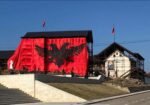Montreal, Canada – Kosovo participated for the first time in the 70th session of the NATO Parliamentary Assembly held in Montreal on Monday. However, Serbia’s delegation was notably absent after their visas were denied by Canadian authorities.
According to RT Balkan, the Serbian delegation, which was expected to include Natasha Jovanović and Zoran Dragišić from the ruling Progressive Party of Serbia, was barred from attending due to the visa refusal. While the official reason for the denial was not disclosed, analysts suspect the issue may be linked to Serbia’s close ties with Russia, particularly its refusal to impose sanctions on Moscow.
Serbia has long maintained a neutral military stance and has declined to join NATO, choosing to align itself with Russia despite increasing pressure from the West. This position, along with its ongoing support for Russia, could explain the visa refusal. Serbia’s commitment to Russia, including its stance on sanctions, continues to complicate its relations with NATO member states.
Meanwhile, Kosovo’s participation marked a significant development, as the country joined the NATO parliamentary meeting for the first time. In the adopted Resolution 494, NATO reaffirmed its commitment to the territorial integrity and sovereignty of countries such as Bosnia and Herzegovina, Georgia, and Moldova, while also supporting their euro-Atlantic integration. The Western Balkans region was mentioned in Point 18, paragraph “m,” emphasizing NATO’s continued dedication to security, stability, and reform in the region, alongside opposition to the malign influence of authoritarian states.
NATO Secretary General Mark Rutte, addressing the session via video message, underscored the need for NATO to strengthen its defense capabilities. “The more we invest in defense, the more we reduce the risk of future conflicts,” Rutte stated, urging member states to increase their defense spending, as security cannot be achieved without investment.
NATO Deputy Secretary General Boris Ruge, who was present in Montreal, responded to questions from parliamentarians during the session. He stressed the importance of continued NATO support for Ukraine, noting the urgency of increasing defense resources. Ruge also participated in the Halifax Security Forum, where he met with Ukrainian Parliament Speaker Ruslan Stefanchuk and members of the U.S. Congress to discuss security concerns in Eastern Europe.







